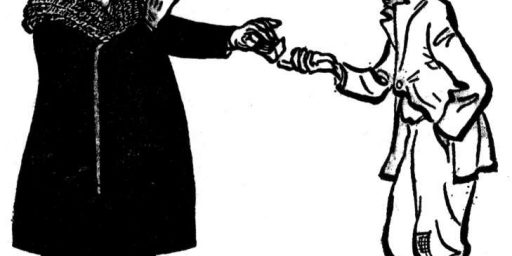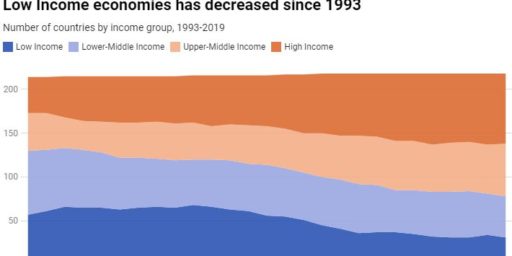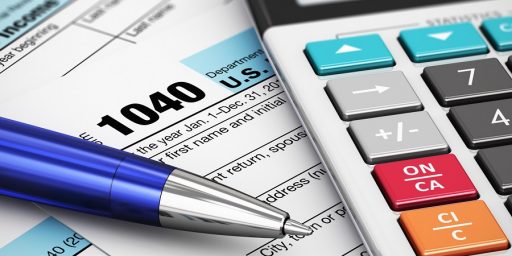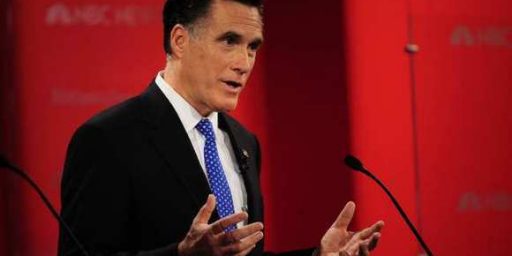WORLD’S RICHEST
Via Dean Esmay and Charles Hill, I see that my annual income puts me easily into the top 1% of the global population, at least according to the calculations available here: Global Rich List. This is certainly not surprising, given the incredible poverty in which the vast majority of the world’s population finds itself. As I often say, we live in one of the few places in the world where poor people are fat.
That said, I find the methodology rather dubious, since it does not take into account cost of living issues or expenses. I’m about to move into a townhouse that costs over three times what I sold a comparable single family home for when I left Alabama. So, while my “wealth” has increased in terms of both income and the value of my home, it’s largely static. Also, my income would provide a lot less “wealth” if I were in poor health and having to spend a lot of money on medication or if I had children or aging parents to support. The calculator takes none of that into consideration.
Update (1227): Their methodology is here. My objections are not altered.
Update (1253): To clarify, my objection is in using income as the sole metric for wealth. While it has a rough utility, it is amazingly imprecise. Comparing, say, two people who make $40,000 a year, one living in Los Angeles and the other in Birmingham and saying they are exactly equal in “wealth” would be silly. For that matter, one could be phenomenally wealthy by virtue of inheritance or even retirement and have little to no “income.”






While your objections are valid, I must point out that if you were poor, you wouldn’t be able to afford the expensive medical care. Just having the expensive medical care is a form of wealth.
The basic medical care you can already get for free, or for very little money. The fact that you would be able to devote a lot of your money for highly expensive drugs and treatments wouldn’t make you less wealthy, it would mean you’d be spending money to maintain your life that another person wouldn’t be able to get at all. So that wouldn’t subtract from your wealth, it would merely determine where your wealth went.
Good points in terms of comparing Americans with those in the less developed countries. But I tend to think of wealth in terms of economic assets, i.e. cash, real property, and the like. Health care is a consumable under this view.
Call me shallow, but I couldn’t get past the whole mechanics of the thing.
At a minimum, I think the Plea-o-meter at the Global Rich List should be recalibrated. If you put in $90 or less as your annual income they tell you they can’t determine your exact position on the list. They also tell you that you’re too poor to be asked to donate to Care International.
However, if you make $91 annually, they don’t seem to have a problem asking you to donate $.06 (after all, there are 219,277,108 people in the world worse off than you are). Seems pretty regressive to me.
In fairness to the site, it’s not trying to act as your accountant or anything; it’s merely trying to shame you into a contribution.
And while I don’t think of myself as well off, I am a hell of a lot better off than I was, say, fifteen years ago, when I was spending occasional nights in shelters or welfare hotels.
Hi James,
As one of the poeple behind the Global Rich List I completely take your points into account regarding the methodology. However, there are a number of reasons why the site ended up as it did:
* Worldwide economic data regarding wealth/income is notoriously flawed and hard to come by. So even if we used Purchasing Power Parity to compare between areas of the world the results would still not be accurate (plus the calculations and data gathering would have reached a level of complexity that we did not have the resources to manage). For more information have a look at George Monbiot’s article:
http://www.monbiot.com/dsp_article.cfm?article_id=576
* We have also looked at income rather than true wealth, (for the same reasons as above).
* We have strived to keep the mechanic simple and not require people to give us lots of information about what they choose to spend their money on. For most people even inputting a couple of numbers is a barrier.
Also if we’d called it ‘The Inprecise Global Gross Income List’ it wouldn’t have had the same ring to it 😉
Again, apologies if you do not feel that what we’ve put together is valid – however, positive comments about the site being thought provoking and interesting have far outweighed the negative.
Ultimately we wanted to create something that hopefully raises some money for charity, and makes some people consider their wealth/income in a wider context than their everyday situation.
Kind regards
Iain
Iain,
Sounds reasonable enough. Again, if your goal is simply to demonstrate that those of us in the West are phenomenally wealthy by global standards, almost any metric works well enough. More precise measures would be needed for apples-to-apples comparisons within the West or within the LDCs.